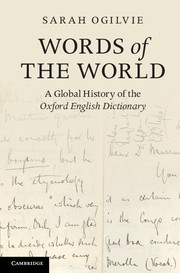Book contents
- Frontmatter
- Contents
- List of illustrations
- List of appendix figures
- Miscellaneous Frontmatter
- Preface
- Acknowledgements
- 1 Entering the OED
- 2 A global dictionary from the beginning
- 3 James Murray and Words of the World
- 4 James Murray and the Stanford Dictionary controversy
- 5 William Craigie, Charles Onions, and the mysterious case of the vanishing tramlines
- 6 Robert Burchfield and words of the world in the OED Supplements
- 7 Conclusion
- Bibliography
- Index
- Plate Section
7 - Conclusion
Published online by Cambridge University Press: 05 November 2012
- Frontmatter
- Contents
- List of illustrations
- List of appendix figures
- Miscellaneous Frontmatter
- Preface
- Acknowledgements
- 1 Entering the OED
- 2 A global dictionary from the beginning
- 3 James Murray and Words of the World
- 4 James Murray and the Stanford Dictionary controversy
- 5 William Craigie, Charles Onions, and the mysterious case of the vanishing tramlines
- 6 Robert Burchfield and words of the world in the OED Supplements
- 7 Conclusion
- Bibliography
- Index
- Plate Section
Summary
Samuel Johnson defined lexicographer as ‘a writer of dictionaries; a harmless drudge that busies himself in tracing the original, and detailing the signification of words’, and there is truth in that. Day after day, the lexicographer works on words beginning with the same letter – padishah, padkos, padmasana, pahareen, pahit, paho, pahoehoe, pajero, pakalolo, pakeha . . . But that process is never exactly ‘harmless’, to use Johnson’s language – which is to say it is never neutral. Every decision a lexicographer makes has consequences, and those consequences are almost always political, reflecting the values of the individual editor and his or her context: to include a word or not; to give all pronunciations – naturalized or foreign; to list every way that word has ever been spelt; to trace its etymology back to its furthest source or to stop at the donor language to English; to define using metalanguage or a regional label; to include quotations from regional and local sources or only British publications; to include quotations from spoken sources. These are all steps in the dictionary-making process and each has political and cultural implications which readers, journalists, and scholars will happily criticize and pull apart.
When I went to work at the OED in 2001, I arrived with the common belief that the OED was, and had been until the 1970s, a distinctly British product in its making and its content. But my editing of words from outside Europe, which was my remit as an editor at the OED, gave a different impression, and as I explored papers in the OUP archives and analyzed the actual text, I began to see the dictionary in a whole new light. This has consequences for an oft-told tale.
- Type
- Chapter
- Information
- Words of the WorldA Global History of the Oxford English Dictionary, pp. 210 - 212Publisher: Cambridge University PressPrint publication year: 2012



